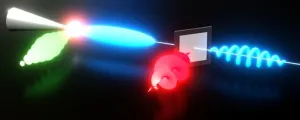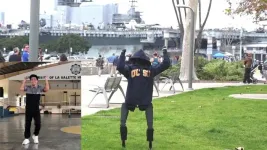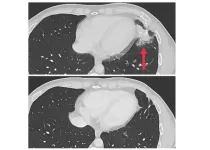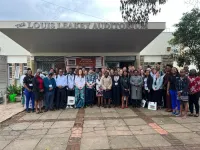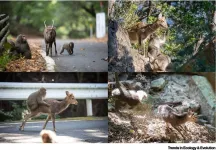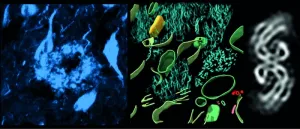(Press-News.org) Researchers from The University of Queensland have identified how a common bacterium is able to manipulate the human immune system during respiratory infections and cause persistent illness.
The research, led by Professor Ulrike Kappler from UQ’s School of Chemical and Molecular Biosciences, studied the virulence mechanisms of Haemophilus influenzae, a bacterium that plays a significant role in worsening respiratory tract infections.
“These bacteria are especially damaging to vulnerable groups, such as those with cystic fibrosis, asthma, the elderly, and Indigenous communities,” Professor Kappler said.
“In some conditions, such as asthma and chronic obstructive pulmonary disease, they can drastically worsen symptoms.
“Our research shows the bacterium persists by essentially turning off the body’s immune responses, inducing a state of tolerance in human respiratory tissues.”
Professor Kappler said the bacterium had a unique ability to ‘talk’ to and deactivate the immune system, convincing it there was no threat.
The researchers prepared human nasal tissue in the lab, growing it to resemble the surfaces of the human respiratory tract, then monitored gene expression changes over a 14-day ‘infection’.
They found very limited production of inflammation molecules over time, which normally would be produced within hours of bacteria infecting human cells.
“We then applied both live and dead Haemophilus influenzae, showing the dead bacteria caused a fast production of the inflammation makers, while live bacteria prevented this,” Professor Kappler said.
“This proved that the bacteria can actively reduce the human immune response.”
Co-author and paediatric respiratory physician Emeritus Professor Peter Sly from UQ’s Faculty of Medicine, said the results show how Haemophilus influenzae can cause chronic infections, essentially living in the cells that form the surface of the respiratory tract.
“This is a rare behaviour that many other bacteria don’t possess,” Emeritus Professor Sly said.
“If local immunity drops, for example during a viral infection, the bacteria may be able to ‘take over’ and cause a more severe infection.”
The findings will lead to future work towards new treatments to prevent these infections by helping the immune system to recognise and kill these bacteria.
“We’ll look at ways of developing treatments that enhance the immune system’s ability to detect and eliminate the pathogen before it can cause further damage,” Professor Kappler said.
The research was published in PLOS Pathogens.
END
Respiratory bacteria ‘turns off’ immune system to survive
2024-07-11
ELSE PRESS RELEASES FROM THIS DATE:
Structured electrons with chiral mass and charge
2024-07-11
Have you ever placed the palm of your left hand on the back of your right hand, in such a way that all fingers point in the same direction? If you have, then you probably know that your left thumb will not touch its right counterpart. Neither rotations nor translations nor their combinations can turn a left hand into a right hand and vice versa. This feature is called chirality.
Scientists at the University of Konstanz have now succeeded to imprint such a three-dimensional chirality onto the wave function of a single electron. They used laser light to shape the electron’s matter wave into left-handed or right-handed coils ...
Learning dance moves could help humanoid robots work better with humans
2024-07-11
Engineers at the University of California San Diego have trained a humanoid robot to effortlessly learn and perform a variety of expressive movements, including simple dance routines and gestures like waving, high-fiving and hugging, all while maintaining a steady gait on diverse terrains.
The enhanced expressiveness and agility of this humanoid robot pave the way for improving human-robot interactions in settings such as factory assembly lines, hospitals and homes, where robots could safely operate alongside humans or even replace them in hazardous environments like laboratories or disaster sites.
“Through expressive and more human-like ...
Women and social exclusion: The complicated nature of rejection and retaliation
2024-07-11
New research from the University of Ottawa (uOttawa) has provided a complicated glance into young women’s responses to interpersonal conflict, with retaliation often the answer to rejection and perceived social exclusion by other females.
The study, published in Nature’s Scientific Reports, highlights the complicated nature of women’s interpersonal relationships by examining the stress arising from rejection, and if the personal characteristics of those imposing the rejection influences ...
Immunotherapy approach shows potential in some people with metastatic solid tumors
2024-07-11
Early findings from a small clinical trial provide evidence that a new cellular immunotherapy approach may be effective in treating metastatic solid tumors. In the trial, researchers from the National Institutes of Health (NIH) genetically engineered normal white blood cells, known as lymphocytes, from each patient to produce receptors that recognize and attack their specific cancer cells. These initial findings are from people with metastatic colorectal cancer who had already undergone multiple earlier treatments. The personalized immunotherapy shrank tumors in several patients and was able to keep the tumors from regrowing for up to seven months. ...
Neighborhood impact on children's well-being shifted during COVID-19 pandemic, ECHO study suggests
2024-07-11
The COVID-19 pandemic significantly disrupted daily life and has raised concerns about its impact on children’s well-being. A new study from the NIH Environmental influences on Child Health Outcomes Program (ECHO) sheds light on how a neighborhood’s physical and social environment influenced a child’s well-being before and during the pandemic.
According to an analysis of ECHO Cohort data, the neighborhood environment was less likely to be associated with child well-being during the ...
Neurobiologist Sung Soo Kim receives 2024 Scholar Award from McKnight Foundation
2024-07-11
(Santa Barbara, Calif.) — Birds migrating. Your cat, returning home from a day of roaming. Bees taking pollen to their hives. You, finding yourself back home without actually remembering the drive from work. Animal navigation is a fundamental behavior, so innate that most of the time we don’t notice that we’re doing it. And yet, so many times a day we (and the animals around us) unerringly find our ways to our target locations whether they be old haunts or new venues, from different directions and even in the dark.
How do we do it? That’s the question UC Santa Barbara neurobiologist Sung Soo Kim seeks to ...
Charting an equitable future for DNA and ancient DNA research in Africa
2024-07-11
CLEVELAND AND NAIROBI — July 11, 2024 — Today, the American Journal of Human Genetics published a perspective piece on the need for an equitable and inclusive future for DNA and ancient DNA (aDNA) research in Africa. The paper, coauthored by an international team of 36 scientists from Africa, North America, Asia, Australia, and Europe, was led by Dr. Elizabeth (Ebeth) Sawchuk of the Cleveland Museum of Natural History and Dr. Kendra Sirak of Harvard University.
DNA from ancient and living African peoples is critical for researchers studying our species’ evolution and population ...
Introducing co-cultures: When co-habiting animal species share culture
2024-07-11
Cooperative hunting, resource sharing, and using the same signals to communicate the same information—these are all examples of cultural sharing that have been observed between distinct animal species. In an opinion piece published June 19 in the journal Trends in Ecology & Evolution, researchers introduce the term “co-culture” to describe cultural sharing between animal species. These relationships are mutual and go beyond one species watching and mimicking another species’ behavior—in co-cultures, both species influence each other in substantial ways.
“Co-culture challenges the notion ...
Study finds health risks in switching ships from diesel to ammonia fuel
2024-07-11
As container ships the size of city blocks cross the oceans to deliver cargo, their huge diesel engines emit large quantities of air pollutants that drive climate change and have human health impacts. It has been estimated that maritime shipping accounts for almost 3 percent of global carbon dioxide emissions and the industry’s negative impacts on air quality cause about 100,000 premature deaths each year.
Decarbonizing shipping to reduce these detrimental effects is a goal of the International Maritime Organization, ...
Seeing inside Alzheimer’s disease brain
2024-07-11
Scientists investigating Alzheimer’s disease have determined the structure of molecules within a human brain for the very first time.
Published today in Nature, the study describes how scientists used cryo-electron tomography, guided by fluorescence microscopy, to explore deep inside an Alzheimer’s disease donor brain.
This gave 3-dimensional maps in which they could observe proteins, the molecular building blocks of life a million-times smaller than a grain of rice, within the brain.
The study zoomed in on two proteins that cause dementia– ‘β-amyloid’, a protein that forms microscopic ...


